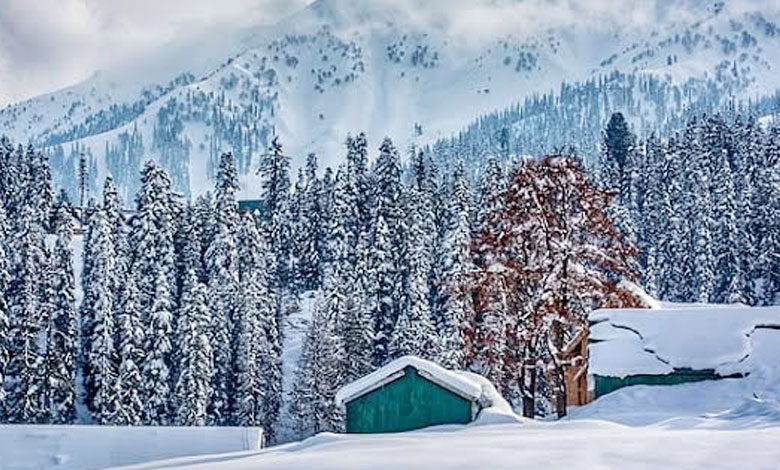Srinagar: Kashmir is experiencing an intensified cold wave, with Srinagar city recording a minimum temperature of -3.5°C on Tuesday, marking a significant drop in temperatures.
The ongoing cold wave is expected to continue and intensify over the next several days, with the region bracing for more challenging weather conditions.
The Meteorological (MeT) department has forecast a prolonged period of cold weather, with the possibility of snow and sub-zero temperatures impacting daily life across Jammu and Kashmir.
Intense Cold Wave to Persist for the Coming Week
According to the MeT department, the cold wave will persist for the next four to eight days, with the intensity of the cold weather expected to increase in the coming days. The department has issued a detailed weather forecast for the region, which indicates two western disturbances (WD) in quick succession will affect Jammu and Kashmir and the surrounding areas starting January 1.
- January 1-2 (Feeble WD): The weather is expected to remain generally cloudy, with light snow at scattered places during the evening and night of January 1, continuing into the morning of January 2.
- January 3-6 (Moderate WD): A moderate western disturbance is forecast to bring generally cloudy skies with light to moderate rain in the plains of Jammu and snow in many areas of Jammu and Kashmir. The peak of the activity is expected to occur on January 4 and 5.
The department has also issued an advisory urging residents, tourists, and travelers to take precautions due to the cold wave conditions, including icy roads and the potential for heavy snowfall in isolated higher reaches during January 4 and 5.
Sub-Zero Temperatures Across the Region
The cold wave has led to a significant dip in temperatures across the region, with several areas recording sub-zero temperatures. As per the latest data:
- Srinagar recorded a minimum temperature of -3.5°C.
- Gulmarg experienced a severe dip, with temperatures plunging to -11.5°C.
- Pahalgam recorded -8.4°C.
Other areas in the region also reported significant drops in temperature:
- Jammu City had a relatively milder temperature of 7.1°C.
- Katra town recorded 5°C.
- Batote saw a chilling 1.5°C.
- Banihal dropped to -2.3°C.
- Bhaderwah had a minimum temperature of -1.4°C.
These sub-zero temperatures are typical of the ongoing “Chillai Kalan,” a 40-day period of intense cold that began on December 21 and will continue until January 30. This period is known for its harsh weather, characterized by freezing temperatures and heavy snowfall, especially in the higher reaches of the region.
Health Advisory Amid Cold Waves
The extreme cold conditions have raised concerns about health risks, particularly for vulnerable populations such as the elderly and children. Doctors have advised people to take extra precautions to protect themselves from the intense cold. Hypothermia and respiratory ailments are major causes of concern, and the cold weather has been linked to several deaths in the region, especially among individuals with pre-existing health conditions.
Cardiologists have warned that the cold weather can cause constricted blood vessels, which may lead to serious heart conditions such as myocardial infarction (heart attack) and heart failure. These conditions have contributed to the deaths of some high-risk patients in recent days.
Residents are urged to avoid prolonged exposure to sub-zero temperatures, particularly in open areas, and to take steps to stay warm indoors. Authorities have also recommended that people wear multiple layers of clothing, keep homes heated, and use space heaters safely.
Also Read | Fresh Snowfall Blankets Kashmir, Disrupts Air, Road, and Rail Traffic
Travel and Transport Advisory
The severe cold wave has also affected travel conditions, particularly in the higher reaches of Jammu and Kashmir. Snowfall, icy conditions, and sub-freezing temperatures over roads can make travel hazardous, and the MeT department has urged tourists, travelers, and transporters to follow official advisories regarding road safety and weather conditions.
Officials have cautioned that heavy snowfall is expected in the isolated higher reaches during the peak cold wave period of January 4 and 5, which may disrupt road transport and cause travel delays. People planning to travel to the region are advised to check weather updates and take necessary precautions before embarking on their journeys.
Preparing for the Cold: Tips for Residents and Travelers
As the cold wave continues to impact the region, authorities and health experts recommend the following measures to ensure safety and well-being:
- Wear warm clothing: Layering clothes can help trap body heat and protect against the cold.
- Avoid prolonged outdoor exposure: Limit the time spent outside, especially during the coldest parts of the day.
- Use heating sources carefully: Ensure that heating equipment is used safely to prevent fire hazards.
- Monitor vulnerable individuals: Keep a close eye on elderly individuals and children, who are more susceptible to cold-related health issues.
- Stay updated on weather forecasts: Regularly check weather updates and follow travel advisories to stay informed about the conditions

